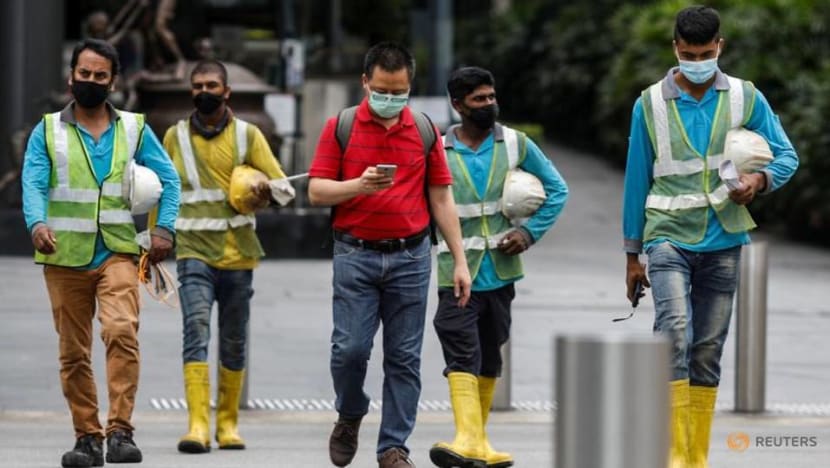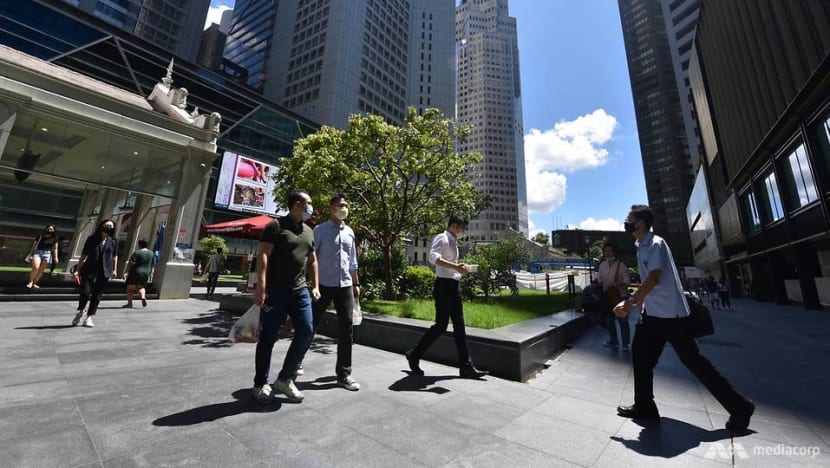commentary Commentary
Commentary: Employers who lowball jobseekers based on last-drawn salaries are shooting themselves in the foot
Asking for a candidate’s last-drawn salary may not be a crime, but misusing the information is a crime against your own business, says PeopleSearch’s Teo Howe Yuin.

People cross a street during morning peak hour commute amid the coronavirus disease (COVID-19) outbreak in Singapore June 3, 2020. (photo: REUTERS/Edgar Su)
SINGAPORE: When Minister for Manpower, Josephine Teo said in Parliament on Thursday (Jun 4) that there are no rules stating that jobseekers must declare their last-drawn salaries, and employers cannot insist they do so, you would think jobseekers would feel reassured.
However, in reality, while there are no such rules, about 95 per cent of employers, local and international firms, routinely ask for candidates’ last-drawn salaries in physical or online application forms and jobseekers rarely resist.
Crisis or no crisis, if you want or need a job, you are likely to comply for fear of not even being considered should you decline to reveal the information.
Ms Teo said that if a company bases the applicant’s “worth to the organisation” solely on the last-drawn pay, her advice to jobseekers would be: “Look for another employer. This is not a company that you should spend too much on.”
But the current crisis has thrown into sharper focus the power dynamics between employers and jobseekers and this may be easier said than done at a time when employers clearly have the upper hand.
READ: Commentary: Soon you may be competing with talent globally. The Fortitude Budget is a wake-up call
READ: Commentary: The weird and disorienting uncertainty of starting a new job under COVID-19
While it is tempting to call for a ban on the practice of asking for last-drawn salaries, such bans may be challenging to enforce at this time.
With rules in place, employers won’t ask for such information overtly on application forms, but can easily insist on it during job interviews. Whether or not a candidate is comfortable revealing the information, he or she might do so uncomplainingly during a crisis.
REASONS FOR ASKING COULD BE LEGITIMATE; WORK IN CANDIDATES’ FAVOUR
Granted, the laws banning the practice in certain cities and states in the US could curb discrimination against historically underpaid groups.

However, we should not see the revelation of such information as being necessarily disadvantageous to the candidate.
The information per se is not problematic. What’s problematic is how employers choose to use it.
Ms Teo is right in pointing out that a candidate's last-drawn salary can help employers gauge his or her seniority or make an appropriate job offer.
Don’t get me wrong. Salary history data must not be used as the sole reference to determine an offer, but it could certainly help complete the picture.
There are a slew of factors to consider when determining a salary offer.
These include work scope, market benchmarks, candidates' skills, experience level and potential to achieve business goals, internal equity (what others with a similar scale of job responsibilities within the organisation are paid), the company’s manpower budget, employment terms, and prevailing economic conditions.
For candidates, sometimes, the growth opportunities a job offers could far outweigh the question of salary.
Ultimately, it’s a process of negotiation.
LISTEN: How Singapore businesses and workers can thrive in a post-pandemic new normal
READ: Commentary: What a lousy time to graduate, what an unfair handicap for graduating students
Salary history information, which also includes annual and performance bonuses, is useful insofar as it gives an indication of how much to offer without insulting the candidate.
The last time a candidate I was representing refused to reveal his last-drawn salary, the prospective employer ended up offering an amount that was unsatisfactory in spite of taking into account the various factors outlined earlier.
The company lost the candidate. Both parties lost valuable hours as each had to begin their search anew.
“EXPECTED SALARIES” CAN BE PROBLEMATIC TOO
Why not just ask for the candidate’s expected salary then?

Working off salary expectations poses a different set of problems.
Singapore has traditionally had a very tight labour market. Under such conditions, candidates are likely to inflate their expectations.
The macro effects of this on Singapore’s labour force in the long term can be damaging - the price point of talent increases and we become unattractive as a talent market.
MAKING SENSE OF THE INFORMATION
If employers decide to use last-drawn salary information as a factor in determining salary offers, we urge them to use it judiciously.
Among other things, employers need to consider the reputation of the candidate’s previous employer. Is the company known for underpaying talent?
If so, let’s not consider the candidates’ last-drawn salary at all.
READ: Commentary: Do you really want to work from home forever like some Twitter employees can?
READ: Commentary: This COVID-19 outbreak, corporate leaders should acknowledge they don’t have all the answers
A recent news report quoted a fresh graduate who turned down a job offer because the salary offered was “way below average” and he was concerned that future employers would peg his salary to this amount too.
While these concerns are legitimate, in our experience, sensible employers realise that if they insist on using crisis-era salaries as a key benchmark in non-crisis conditions, they could end up losing out on the best talent.
About 10 per cent of employers may use the information to lowball candidates, but in my experience, such employers would lowball candidates whether or not they had access to their last-drawn salary information.
EMPLOYERS WHO LOWBALL TALENT ARE ONLY SABOTAGING THEMSELVES
While jobseekers should adjust their salary expectations downwards during a crisis, employers who routinely and inordinately lowball candidates need to realise that they are merely sabotaging themselves.

Word will inevitably get out, tarnishing your employer brand. When the economy improves, you’ll struggle to hire and retain the best talent.
This has serious consequences for business recovery, growth and sustainability especially in an era of transformation.
Accelerated digital transformation has not eliminated the need for human resources. In fact, many thriving firms are in search of skilled strategists and people who can execute high-level projects during this time or in the near future to prepare them for economic recovery.
A 2019 study by Oxford Economics said that robots could take over 20 million manufacturing jobs around the world by 2030, but the researchers also advised governments to incentivise companies and workers to engage in retraining programmes to be able to do high-level jobs.
The Government’s emphasis on reskilling programmes to ensure employability is therefore necessary and commendable.
READ: Commentary: Arts and humanities can set you up for life in post-coronavirus world
READ: Commentary: The brewing concern over jobs and salaries as COVID-19 persists
Among the candidates we represent, we have found that having sought-after skills, traits and capabilities renders last-drawn salary information irrelevant.
RETHINK HOW WE VALUE HUMAN LABOUR AND TALENT
At the heart of this issue lies the question of how we determine the monetary value of human labour and talent.
This has been an ongoing concern in regard to low-wage workers such as cleaners and security personnel.
Member of Parliament Zainal Sapari recently said the COVID-19 crisis should force us to rethink the value our society has placed on such essential service workers.
READ: COVID-19: New migrant worker dorms step in the right direction, say support groups - but could more be done?
LISTEN: Singapore's relationship with migrant workers: It's complicated?
“The services provided by these workers are truly useful and necessary, and the impact will be felt if the work is not done. Unfortunately, in many societies, the more useful the work is, the less they pay you,” he said in Parliament on Jun 4.
Saadia Zahidi managing director of New Economy and Society at the World Economic Forum highlighted similar concerns in a recent commentary.
Making a call for revaluing essential work and improving the quality of jobs, she said it’s “imperative that governments, businesses and workers’ representatives work together to lead a new historical shift in upgrading the protocols that govern our labour markets". She added:
The pandemic has exposed more glaringly than ever before the inadequacies and inequalities in the system of the past. Yet it has also refocused the minds of global leaders on the fundamental value of human life, human potential and human livelihoods. This is the window of opportunity to invest in our most precious asset: our human capital.
Perhaps this is an opportunity to rethink our paradigms across all levels of human resources.
Businesses need to move beyond thinking about cutting corners for short-term survival. Instead, we should consider long-term survival and sustainability.
We must recognise that respecting and rewarding our people is critical to achieving these goals.
LISTEN: Disruption 101: How COVID-19 is revolutionising work
BOOKMARK THIS: Our comprehensive coverage of the coronavirus outbreak and its developments
Download our app or subscribe to our Telegram channel for the latest updates on the COVID-19 outbreak: https://cna.asia/telegram
Teo Howe Yuin is Director of the Financial Services Recruitment Group at PeopleSearch, an executive search firm with a presence in six cities including Singapore.












